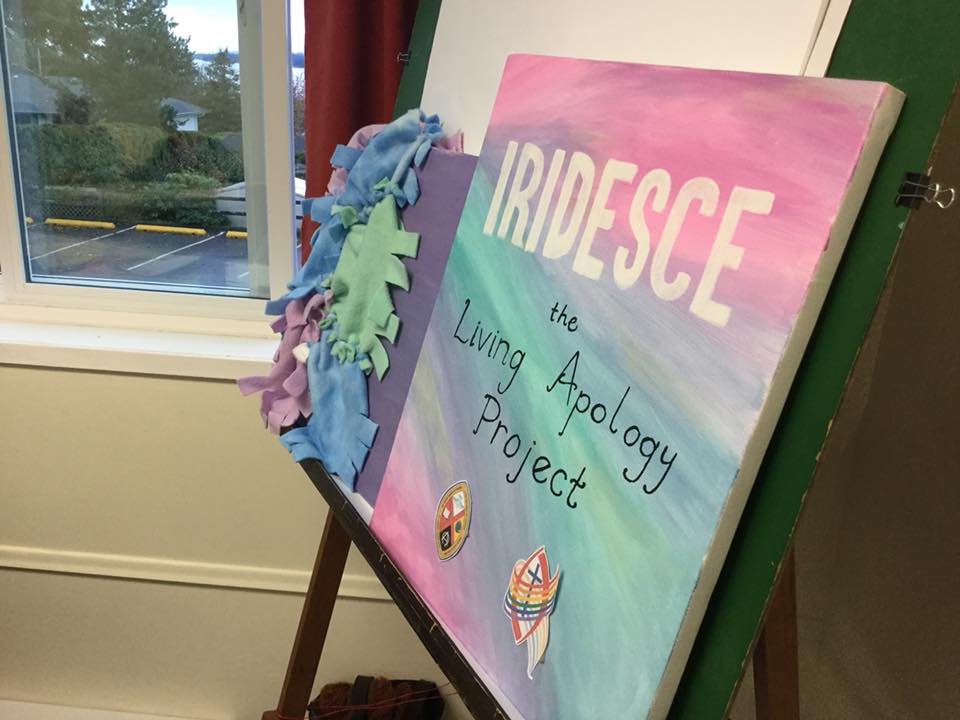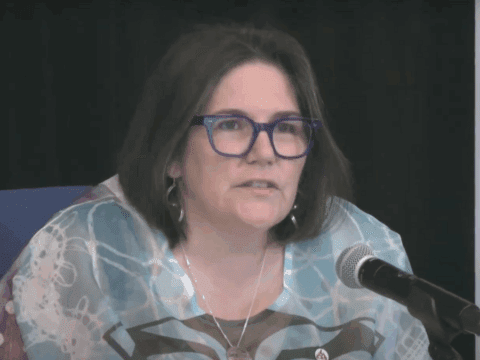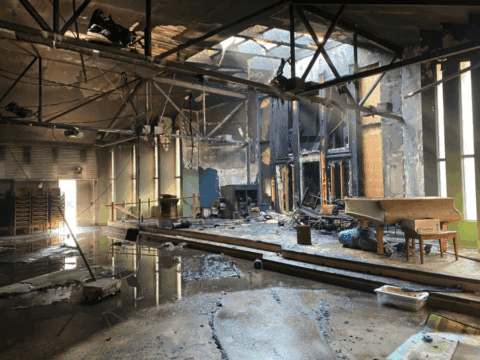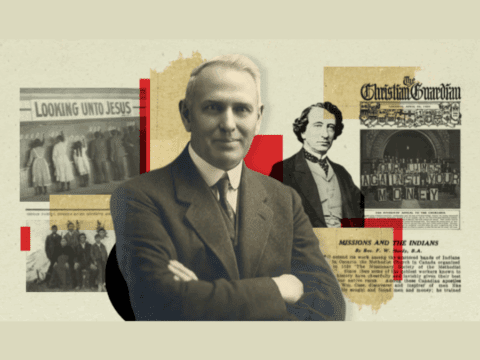I was born in 1986. Two years later, the United Church voted in favour of formally declaring that all people are welcome as full members, and eligible for ordered ministry, regardless of sexual orientation. Nonetheless, when I was coming out to myself as gay in the early 2000s, there was no way I was going to do so in the church. My church’s silence on “the issue” solidified my own silence.
Much has changed for me, and for the United Church. Now, I’m comfortable holding hands with my partner in the sanctuary. My church camp hosts a week for transgender campers. The United Church ministries I’m a part of feel queer-friendly to me, and I know many LGBTQ people and allies who chose the United Church for its affirming stance.
One of those people is Aaron Miechkota. She joined the United Church as a teenager in the 1990s, leaving her former denomination when it decided not to ordain gay and lesbian people. Now an inquirer for ministry in the United Church, Miechkota is travelling across the country to hear stories of the 1988 vote. It was a landmark decision for human rights in the United Church, in Canada and indeed internationally, but before ’88, LGBTQ congregants were marginalized in the church. The harm and prejudice they experienced didn’t end after the vote, and in some places, it continues today.
Miechkota is the co-ordinator of Iridesce: The Living Apology Project. It’s an invitation to share stories of before, during and after the 1988 decision. Iridesce is a joint project of Affirm United and The United Church of Canada and is funded by Mission & Service. Over 70 stories have been posted at iridesce.ca, including poems, letters, interviews, prayers, art and personal narratives. The project will culminate at the General Council meeting in July, when stories will be shared, likely in an interactive multimedia display.
Exploring the entries, I read about gratitude for the United Church’s inclusiveness, and also had my eyes opened to some horrific treatment. One church member shared memories from the early ’80s when he was starting to become aware of his sexuality. “The side opposing gay inclusion was so strong. If you disagreed, you were attacked verbally and emotionally,” he told Iridesce. “These were extremely difficult things to listen to.” When his congregation learned he was gay, “church became a very unsafe environment. . . . I was being judged. I felt totally alienated. When I went to church on Sunday morning, no one would speak with me.” He and his entire family had to leave the congregation.
As the ’88 vote approached, the hostility escalated to threats of violence for some. Rev. Bev Brazier was a young minister who supported the pro-inclusion stance as an ally to LGBTQ people. The rhetoric surrounding the vote “was awful,” says Brazier. “I received death threats. I received just outrageous anonymous letters.”
The late Anne Squire, who was general secretary of ministry, personnel and education and then moderator from ’86 to ’88, also received many “vitriolic” letters, according to a testimony shared with Iridesce. At times, she was receiving hundreds of letters every day, the majority against the church’s study of sexual orientation and ministry. “They blamed me personally for the mess in the church,” she wrote. One letter finished with, “my prayer is that you will be stricken with AIDS,” and was signed “yours in Christ.”
These stories illustrate why Iridesce’s truth-telling venture is framed as an apology project. To ensure that LGBTQ people do not have to do all the work of creating an apology themselves, Iridesce also wants to hear from allies, friends, family and congregants — those who were involved in 1988 and the decade after, and those still struggling with LGBTQ inclusion.
The decade from 1988 to 1998, nicknamed the Issue Years, was a time of celebration, but also fraught with internal struggle. The positive decision did not mean the culture changed overnight. According to a poll taken before the vote, only 28 percent of church members supported ordaining gay and lesbian ministers. Thousands of people left the United Church.
Some who stayed joined “reform” groups, such as the Community of Concern, which was formed specifically to resist the 1988 decision. It had over 40,000 supporters and lobbied to have the General Council overturn the decision in 1990. That year, General Council received 50 anti-LGBTQ petitions.
With a denomination that seemed poised to split, many people still hid their sexual identities. Other gay and lesbian church members just left. For another anonymous writer to Iridesce, there was an “absence of welcome [and] safety” after ’88 for her as a lesbian Christian. “The emphasis was placed on reassuring people with prejudices that they could hold on to them,” she writes. “Churches were reassured that they did not have to call gay or lesbian ministers.” She left the church and didn’t return for decades.
Today, we can count safer spaces in the United Church. Affirm United tracks the number of ministries — including camps, Conferences, Presbyteries, education centres and the like — that have completed the Affirming Ministries Program. To be recognized as affirming, ministries study and reflect on LGBTQ issues. A positive vote of 75 percent or more is needed before a ministry can officially declare that they are “fully inclusive of people of all sexual orientations and gender identities.” Other requirements must be met, such as having an inclusive marriage policy and hosting a public celebration.
Are these parties under rainbow banners being held everywhere across Canada? Not really. A recent count tallies 199 affirming ministries, 168 of which are congregations. Another 125 ministries are currently in the process of joining the ranks. But with roughly 3,000 ministries of all kinds across the church, it means that fewer than 10 percent are officially affirming.
Among the remaining churches, many are still welcoming to LGBTQ people. But some are not. Since marriage is a local decision, individual churches can still refuse to perform same-gender weddings.
I had thought that all United churches were basically LGBTQ-friendly, and that this inclusion was an important part of our identity. Miechkota says that there is indeed a narrative of LGBTQ welcome that we like to tell ourselves and share with the broader community. Through the stories of Iridesce, she says it’s emerging as “an early trend” that the welcome we assume we offer may not line up with the realities experienced by LGBTQ people in our church today. “Maybe we’re not as far along as we think we are,” she says.
The point of Iridesce is “to reflect, to share, to listen, to be heard,” says Miechkota. “That, in itself . . . is worthwhile and healing.” Participants can submit stories online or share them one-on-one in person. Iridesce has visited seven locations across the country so far, with 10 more already scheduled. When requested, Miechkota hosts a workshop where participants listen to stories from the project and tell their own. They meet in a familiar, comfortable environment, with ongoing support available from their home congregations to reduce vulnerability and address potential retraumatization.
Brazier is now the minister of Whitehorse United, which took part in one of the workshops. “Everybody was in tears at the end,” she says. “Good tears.” For her, the Issue Years were difficult but also made her more determined. “I had to really ask myself, ‘What is the Gospel, and what is my role?’ Hold the hands of bigots, or hold them to account? How far will I go to speak the truth?”
Iridesce is a place for that truth to be heard. For Miechkota, co-ordinating Iridesce has been “beautiful and transformative.” Hopefully the whole church will join the conversation and come to feel the very same way.














